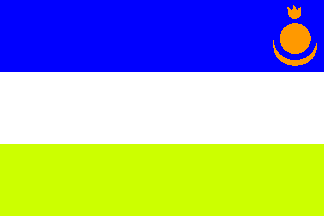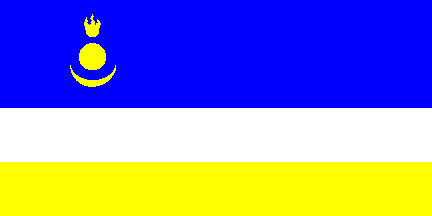
image by Santiago Dotor, 06 Sep 2000 |

Last modified: 2006-07-29 by antonio martins
Keywords: buriatia | buriat | soyonbo | mongolia | stupa | law |
Links: FOTW homepage |
search |
disclaimer and copyright |
write us |
mirrors

(Note: You need an Unicode-aware software and font to correctely view the cyrillic text on this page. See here transliteration details).
Buryat people live in Siberia, near Mongolia; they are Buddhist,
like Kalmykian.
Giuseppe Bottasini
On 29 October 1992 they adopted a State flag, a 2:1:1 light
blue [see bellow!] - white - yellow horizontal stripped one.
At 1/4 from the
left border there is a yellow Mongol device composed of the same
objects (the fire, the sun, the moon) that are on the top of the
Soyombo, the symbol of Mongol Republic.
The Soyombo (a sanskrit-derived word meaning "a self-explaining
writing") was in origin an endmark for lamaistic writings of XVII
century. It became very popular. The three objects represent three
of the four cosmological elements (the fire for heavens or ether,
the sun, the moon for the air) and they are also present in Indian
stupa.
Giuseppe Bottasini, quoting
[zig94]
Whether the distance between the soyonbo and the staff (1/4th)
refers to the centre of the emblem, or to its inner or outer edge
is unclear from the legal text.
Christopher Southworth, 09 Oct 2003
The flag of Buryatia is medium blue (matching the
russian national flag’s shade) not only in
practice but also by law. The only source giving this flag as light blue
is [zig94], which, considering its
publishing date, might very well be wrong or refering to an earlier
flag or flag project. Trusting the book Winds of Change
[rss96], the original flag law of
1992.10.29 stated already «siniĭ» (medium blue), and never a
lighter shade.
António Martins, 10 May 2000
All these three flags, Mongolia’s,
Buryatia’s and Agin Buryatia’s) show
soyonboes.
António Martins, 05 Sep 2000
This flag, in medium blue, is listed under number 123 at the chart
Flags of Aspirant Peoples [eba94] as:
«Buryat Ulus [Buryatia] (Buryat Mongols) - South Siberia».
Ivan Sache, 15 Sep 1999
Here is the relevant text of Law No. 268-XII of the Supreme Soviet of the Republic of Buryatia dated 29 October 1992, with flag usage being slightly amended by Law No. 348-XII of 3 June 1993. Article One (from Winds of Change [r4f96], supplied by Jos Poels and transcribed by myself) reads as follows:
The National flag of Buryatia is a rectangular panel consisting of three horizontal stripes: the upper stripe is blue and occupies one-half the width (of the flag); the middle stripe is white and occupies one-fourth, and the lower stripe is yellow and occupies (the remaining) one fourth of the width of the flag.
In the left upper corner of the blue part of the flag, at the distance of one-fourth of flag length from the staff, is a traditional symbol of Buryatia (soyonbo) depicted in yellow. This symbol is an image of the moon, the sun and a hearth in the following order: at the bottom appears a crescent moon, with the sun above it, and an image of a hearth, from which rise three tongues of flame, above both.
The ratio of the flag width to its length is 1:2.
Christopher Southworth, 09 Oct 2003
 image by Santiago Dotor, 06 Sep 2000 | |
Some kind of music or theater festival was taking place at Sóller, whereby
a weird assortment of flags was displayed in front of the city hall. I can
remember a horizontal blue-white-light green flag with an orange device on the
canton, identical in position, shape and size to that on the
Aghin Buriatia flag. This flag appeared to be also
a sinister hoist version, with no device on the obverse — this image shows the
reverse of the flag I actually saw. The obverse had no canton device.
This flag I saw might be a (very) mistaken version of the Buriatia flag.
Santiago Dotor, 06 Sep 2000
Anything below this line was not added by the editor of this page.